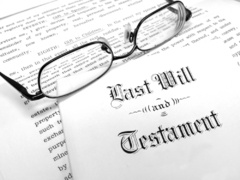Q: My brother died in December 2008 and was trustee of property that our mother purchased years ago. She passed away in the year 2000. My brother was living on the property along with our other brother, who is retired and who still lives there.
There is no known will, and the deceased brother’s estranged spouse signed a quit claim early on relinquishing all rights to the property. There are unpaid property taxes accruing against the property, and a $10,000 balance on a loan that my late brother took out on the property a few years before he passed away.
My question is what do we do now? Can my surviving brother still live in the house? Can control of the property be transferred to me or my brother or does the property go to our offspring? I have three adult children and my late brother also has three adult children. Is this house considered an inheritance because our mother originally owned it?
I was laid off my job in November of last year and can’t afford a real estate lawyer, so we will have to do the ‘legwork’ ourselves. Any advice or suggestions would be most helpful.
A: My condolences on the loss of your brother. I am not an estate lawyer, although that’s what you need at the moment. Still, the first thing to find out is whether the property is actually in a trust, and if so, what kind of trust?
You refer to your late brother as the “trustee” for the property, but I’m not sure if you are actually using the right term. If the property is in a trust, you need to find out who are the beneficiaries of the trust. If your brother was the trustee and the only beneficiary, then you have to figure out whether his children heirs inherited the property.
If he was a trustee for a trust that held the property for the benefit of all of the grandchildren, then it’s likely that those named grandchildren are now the beneficiaries of the trust. You also ask whether you or your other brother is now the trustees for the trust. The trust should have named a successor trustee. That person would now be the trustee for the trust. If no one has been named the successor trustee, you’ll have to go to court to petition the judge to either disband the trust or name someone else the trustee.
Another possible scenario is that the property is not, and never was, in a trust, and your brother wasn’t the “trustee,” as you call him, but was instead the executor for your mother’s estate. If your brother inherited the property, his will would dictate who would inherit the property after he died. If you and your two brothers inherited the property, then depending on how you hold title to the property, perhaps his share (or none) of the property would be inherited by his heirs. If your brother died intestate, or without a valid will, then the court would decide who owns his share of the property.
The complexity of the situation is why I’m suggesting you find an estate attorney to assist you in figuring out what’s going on.
You might try your local Legal Aid Society, if you truly can’t afford an attorney. You might also find an estate attorney who is willing to work with you on a reasonable hourly basis who can at least point you in the right direction.
May 6, 2009







My aunt died this past yr, i moved in her house 5 yrs ago, cuz she could no longer live alone. my question is ive been paying the taxes and insurence and mortgage on the house for 5 yrs and for the last yr living in the house i bought for my family, still paying for that house, there is no will and i want too no what can i do too get the house? pay it off? plz help! ty